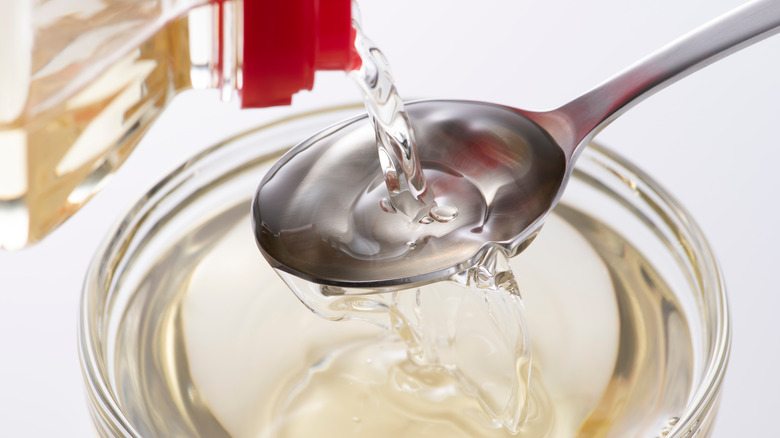Mirin Vs. Sake: What's The Difference?
You're probably familiar with sake, the traditional Japanese alcoholic beverage that is made with fermented rice and is a staple in Asian restaurants around the U.S. But, you may not know there is another type of Japanese rice wine that may not exactly ring any bells when you hear it but is actually a cornerstone of Japanese cuisine: mirin.
Real Simple notes that sake starts with rice, just as wine starts with grapes. However, it is brewed like beer, using mold while yeast converts that rice's sugars to alcohol. Mirin, on the other hand, is made by combining steamed glutinous rice, cultured rice, and shochu, a distilled alcoholic beverage, says The Spruce Eats. So, while each liquid is considered a rice wine and follows a fermentation process, there are a few major things that make them different. This includes the way each is used in Japanese gastronomy, as each has a distinct role.
So, what's the difference?
Yes, sake and mirin are both rice wines, but they are used quite differently in Japanese cuisine and have both found their respective places in the kitchen and at the table.
Just like cooking with wine, cooking with sake is a way to add flavor and depth to dishes. However, Allrecipes explains that sake is normally added to dishes earlier in the cooking process to allow some of the booze to burn off while still enhancing a recipe. Meanwhile, Allrecipes notes that mirin is less alcoholic than sake and is also sweeter than its sister alcoholic beverage. But, unlike sake, it's not used for sipping — its main purpose is to enhance the flavor of food.
While there is a style of sake that is used for cooking, there are plenty of others, both hot and chilled, that are meant to be enjoyed alongside food, not in it. Treated as a condiment and used as commonly as spices and seasonings, per The Spruce Eats, mirin can be used to impart flavor. Often, it finds itself an ingredient in glazes and sauces, unlike where sake would be used. It is also worth noting that mirin is a rice wine and not a rice vinegar, which is fermented longer and is more acidic.

